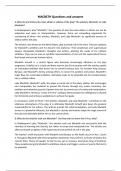MACBETH Ques�ons and answers
1. Who do you think is the main villain or villains of the play? The witches, Macbeth, or Lady
Macbeth?
In Shakespeare's play "Macbeth," the ques�on of who the main villain or villains are can be
subjec�ve and open to interpreta�on. However, there are compelling arguments for
considering all three—the witches, Macbeth, and Lady Macbeth—as significant sources of
villainy within the play.
The witches, also known as the Weird Sisters, play a pivotal role in the story. They are catalysts
for Macbeth's ambi�on and his descent into darkness. Their prophecies and supernatural
powers manipulate Macbeth's thoughts and ac�ons, plan�ng the seeds of his ruthless
ambi�on. They can be seen as symbolic representa�ons of evil and the supernatural forces
that tempt and corrupt human nature.
Macbeth himself is a central figure who becomes increasingly villainous as the play
progresses. Ini�ally, he is a loyal and brave warrior, but his encounter with the witches sparks
an unchecked ambi�on that drives him to commit heinous acts. He murders King Duncan,
Banquo, and Macduff's family, among others, to secure his posi�on and power. Macbeth's
tragic flaw, his unchecked ambi�on, ul�mately leads to his downfall and his transforma�on
into a ruthless villain.
Lady Macbeth, Macbeth's wife, also plays a crucial role in the play's villainy. She encourages
and manipulates her husband to pursue the throne through any means necessary. Her
ambi�on and relentless pursuit of power drive her to commit acts of cruelty and manipula�on.
Lady Macbeth's infamous "unsex me here" soliloquy demonstrates her willingness to discard
her femininity and embrace wickedness to achieve her goals.
In conclusion, while all three—the witches, Macbeth, and Lady Macbeth—contribute to the
villainous atmosphere of the play, it is ul�mately Macbeth himself who bears the greatest
responsibility for his ac�ons. The witches provide the ini�al tempta�on, and Lady Macbeth
serves as a powerful influence, but Macbeth's choices and ac�ons shape the tragic events of
the play and ul�mately define him as the central villain.
2. Why do the witches seek out Macbeth? Do they want to harm him? If so, why?
In Shakespeare's play "Macbeth," the witches seek out Macbeth not necessarily with the
inten�on of harming him directly, but rather to tempt and manipulate him. The witches are
o�en portrayed as agents of the supernatural and symbols of evil in the play.
The witches' ini�al encounter with Macbeth and Banquo on the heath occurs in Act I, Scene
3. They greet Macbeth with three prophe�c statements: they hail him as Thane of Glamis (his
current �tle), Thane of Cawdor (a �tle he has yet to receive), and future King of Scotland.
These prophecies ignite Macbeth's ambi�ous nature and trigger a series of events that led to
his downfall.
, The witches' mo�va�ons are not explicitly stated in the play. However, it can be inferred that
they have an interest in sowing chaos and corrup�on, perhaps for their own amusement or
to disrupt the natural order of things. They seem to take pleasure in toying with human lives
and exploi�ng their weaknesses.
It is important to note that the witches' prophecies alone do not compel Macbeth to commit
the acts of violence and treachery that he does. Macbeth's ambi�on, coupled with his
suscep�bility to their sugges�ons, leads him to pursue the throne through immoral means.
The witches serve as catalysts, exploi�ng Macbeth's weaknesses and manipula�ng his desires,
but the ul�mate responsibility for his ac�ons lies with Macbeth himself.
In summary, the witches in "Macbeth" seek out Macbeth to tempt and manipulate him,
exploi�ng his ambi�on and desires. While their mo�va�ons are not explicitly stated, their
ac�ons serve to set in mo�on a tragic chain of events that lead to Macbeth's downfall.
3. What does Macbeth feel when he first hears the witches’ prophecies? How is his response
different from Banquo’s?
When Macbeth first hears the witches' prophecies, he experiences a mixture of astonishment,
curiosity, and intrigue. The prophecies awaken his dormant ambi�on and fuel his desires for
power and greatness. Ini�ally, he is taken aback by the accuracy of the witches' predic�ons,
as they men�on �tles and posi�ons that were previously unknown to him.
Macbeth's response to the prophecies is characterized by a sense of fascina�on and a growing
eagerness to explore the possibili�es they present. He becomes deeply absorbed in thoughts
of what it would mean to become Thane of Cawdor and, ul�mately, the King of Scotland. The
witches' prophecies act as a powerful catalyst, arousing Macbeth's ambi�on and se�ng him
on a path of ruthless pursuit.
On the other hand, Banquo's response to the witches' prophecies differs significantly from
Macbeth's. While he also appears intrigued by the prophecies, Banquo remains cau�ous and
skep�cal. He ques�ons the witches about the nature of their predic�ons and warns against
the poten�al dangers of trus�ng in such supernatural beings. Banquo senses that the witches
may be luring Macbeth into a trap, and he advises his friend to be wary of their influence.
Unlike Macbeth, Banquo does not let the prophecies consume him with ambi�on. He
maintains a level-headed perspec�ve and remains focused on his own moral compass. This
divergence in response highlights the contras�ng characters of Macbeth and Banquo—
Macbeth's ambi�on and willingness to embrace the supernatural, versus Banquo's skep�cism
and loyalty to his own principles.
In summary, Macbeth feels a sense of fascina�on and ambi�on when he first hears the
witches' prophecies, while Banquo remains skep�cal and cau�ous. Macbeth becomes
consumed by the possibili�es of the prophecies, leading him down a dark path, whereas
Banquo maintains his integrity and wariness of the supernatural.




